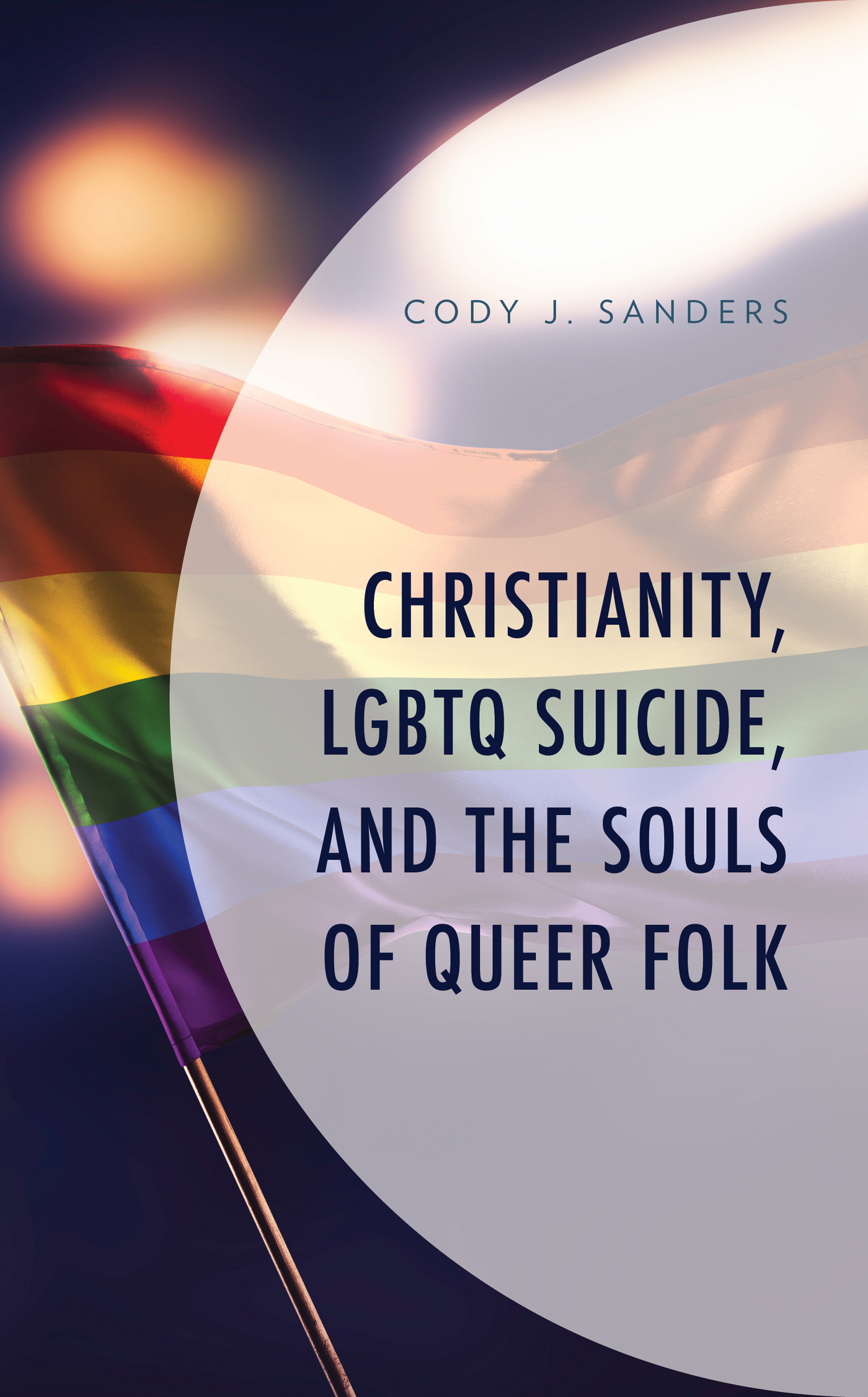Christianity, LGBTQ Suicide, and the Souls of Queer Folk
Emerging Perspectives in
Pastoral Theology and Care
Series Editor
Kirk Bingaman, Fordham University
The field of pastoral care and counseling, and by extension pastoral theology, is presently at a crossroads, in urgent need of redefining itself for the age of postmodernity or even post-postmodernity. While there is, to be sure, a rich historical foundation upon which the field can build, it remains for contemporary scholars, educators, and practitioners to chart new directions for the present day and age. Emerging Perspectives in Pastoral Theology and Care seeks to meet this pressing need by inviting researchers in the field to address timely issues, such as the findings of contemplative neuroscience, the impact of technology on human development and wellness, mindfulness meditation practice for reducing anxiety, trauma viewed through the lens of positive psychology and resilience theory, clergy health and wellness, postmodern and multicultural pastoral care and counseling, and issues of race and class. The series will therefore serve as an important and foundational resource for years to come, guiding scholars and educators in the field in developing more contemporary models of theory and practice.
Titles in the Series
Christianity, LGBTQ Suicide, and the Souls of Queer Folk, by Cody J. Sanders
Warriors Between Worlds: Moral Inquiry and Identities in Crisis, by Zachary Moon
Pastoral and Spiritual Care in a Digital Age: The Future is Now, by Kirk Bingaman
Women Leaving Prison: Justice-Seeking Spiritual Support for Female Returning Citizens, by Jill L. Snodgrass
The Chaplains Presence and Medical Power: Rethinking Loss in the Hospital System, by Richard Coble
Neuroplasticity, Performativity, and Clergy Wellness: Neighbor Love as Self Care, by Williaml D. Roozeboom
Christianity, LGBTQ Suicide, and the Souls of Queer Folk
Cody J. Sanders
LEXINGTON BOOKS
Lanham Boulder New York London
Published by Lexington Books
An imprint of The Rowman & Littlefield Publishing Group, Inc.
4501 Forbes Boulevard, Suite 200, Lanham, Maryland 20706
www.rowman.com
6 Tinworth Street, London SE11 5AL, United Kingdom
Copyright 2020 by The Rowman & Littlefield Publishing Group, Inc.
All rights reserved. No part of this book may be reproduced in any form or by any electronic or mechanical means, including information storage and retrieval systems, without written permission from the publisher, except by a reviewer who may quote passages in a review.
British Library Cataloguing in Publication Information Available
Library of Congress Control Number: 2020932604
ISBN 978-1-7936-0609-9 (cloth : alk. paper)
ISBN 978-1-7936-0610-5 (electronic)
 TM The paper used in this publication meets the minimum requirements of American National Standard for Information Sciences Permanence of Paper for Printed Library Materials, ANSI/NISO Z39.48-1992.
TM The paper used in this publication meets the minimum requirements of American National Standard for Information Sciences Permanence of Paper for Printed Library Materials, ANSI/NISO Z39.48-1992.
To those queer souls for whom life, at times, seems unlivable
Acknowledgments
There is only one group of people for whom the statement, this work would not have been possible without... , is unequivocally applicable. This group of unparalleled importance to this project is comprised of the nine research participants who responded to my call for persons interested in participating in research on LGBTQ suicide and religion. If these nine individuals had not taken a flyer, sent an e-mail, answered a phone call, and then shown up at the appointed time to sit with me to engage in conversation about their lives, there would be no meaningful words with which to fill the following pages. If a different set of participants had volunteered to participate, the work that follows may have taken a different form. Thus, these specific nine people, in all of their particularity, have shaped my engagement with this important topic in meaningful and entirely unique ways. For this I am tremendously grateful.
A second group whose mentoring, support, and scholarly acumen influenced my formation as a pastoral theologian throughout the writing of the original iteration of this work is my dissertation committee at Brite Divinity School. Joretta Marshall, Nancy Ramsay, and Namsoon Kang graciously offered their keen theological insight to my emerging interest in this subject. Through their feedback, these three helped give significant shape to this dissertation where it was lacking. Their engaged curiosity in my developing research sent me in search of new pathways forward in the work when I felt that I was at a dead end. And their encouragement to transform this research into a publishable text was energizing. Through their friendship and support during the transitions of life throughout this writing, they have not just shaped and supported the production of a disembodied work of scholarship. Instead, they have helped sustain my humanity.
I am thankful for my friends and colleagues whose friendship has nourished me through this weighty project, and whose thoughtful, scholarly conversation has made me a better pastoral theologian. These include past colleagues in the PhD program at Brite Divinity School, faculty colleagues who have supported the shaping of my research interests into courses Ive taught at Andover Newton Theological School and Chicago Theological Seminary, and my clergy colleagues in Harvard Square who always express interest in my current writing projects. I am also grateful for the conversation and feedback on the original iteration of this work that I received from Avery Belyeu whose work in LGBTQ justice and suicide prevention is saving lives. I am thankful to Zachary Moon for the feedback I received on the chapter drafts as I transformed the research into the book you now hold. I am grateful for the support of my partner, Cody VanWinkle, as I worked on this manuscript (occasionally while we were on vacation). And I am appreciative for insightful feedback from the peer review I received on this manuscript in the publication process, and from my editors at Lexington Books.
Finally, I am thankful for the honor of receiving a Dissertation Fellowship from the Louisville Institute to fund the research and writing of this research project that began as my PhD dissertation. Moreover, that the Institute saw something of value in my work that they believed would meaningfully contribute to the study of religion and the promotion of vitality in American religious life buoyed my spirits throughout the process of research and writing.
Introduction
Stories give us life. And when life becomes unlivable, there are stories behind that too. For far too long, our religious narratives have contributed to the unlivability of life for LGBTQ people, resulting in suicide. This is the problem I take up in this book in search of a constructive response to the dangers that religious narrative pose to LGBTQ lives.
At its base, this book says something to us about what it means to be human in the midst of storiesto be human because of stories. We cannot understand ourselves without story. We cannot understand who we are in relation to the ultimateGod, Divine Presence, the Sacred, the Holywithout story. Our deepest sense of who we are, our connection to the communities in which our lives are deeply embedded, each of the cherished values and principles and truths that enliven our activity and animate our imaginations, our sense of place and significance in the cosmosall of these are shaped by stories.

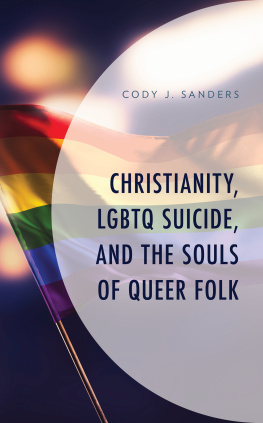

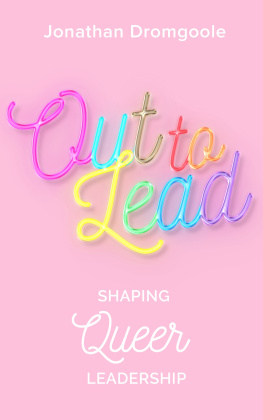
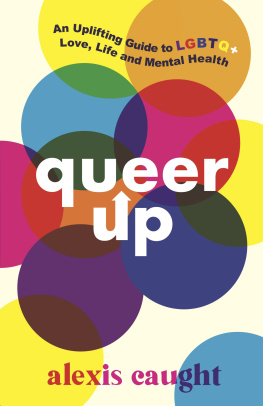

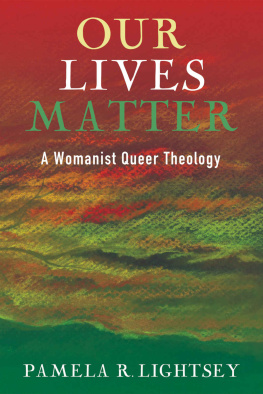
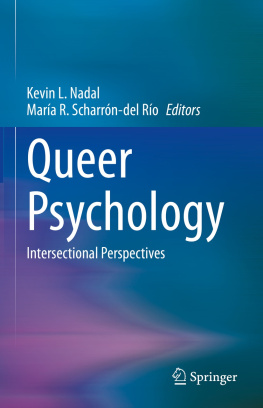
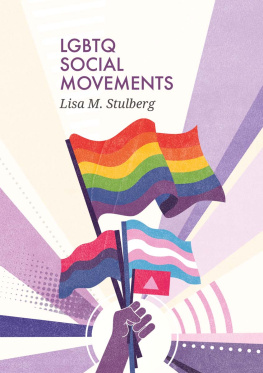
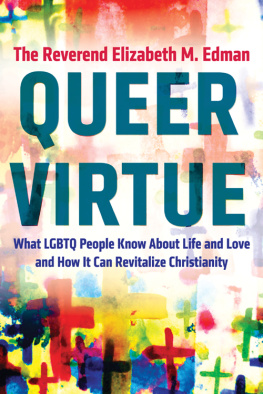

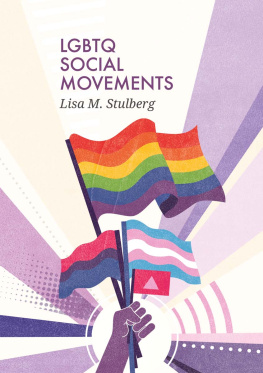
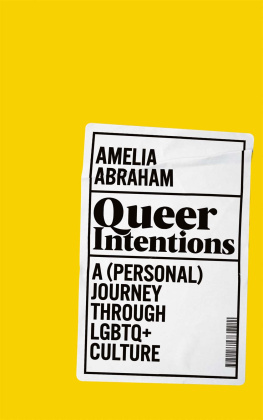
 TM The paper used in this publication meets the minimum requirements of American National Standard for Information Sciences Permanence of Paper for Printed Library Materials, ANSI/NISO Z39.48-1992.
TM The paper used in this publication meets the minimum requirements of American National Standard for Information Sciences Permanence of Paper for Printed Library Materials, ANSI/NISO Z39.48-1992.